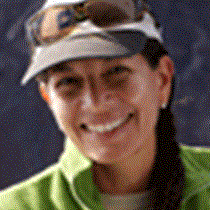Isabela & Fernandina Islands
6:00 am = Wake up call for whale watching!
Roca Redonda is the name of the rounded rock we circled early in the morning trying to spot some dolphins and whales. This rock, located northeast of Isabela, is the remains of an old volcano with no connection to other nearby islands. A perfect nesting site for many marine birds with steep walls that, falling down deep in the water, create a unique ecosystem for many invertebrates as well as large marine creatures, such as hammerhead sharks, sea turtles, manta rays and the always-fascinating whale shark.
Then and soon after crossing the Equator line, a very special guest arrived from the deep waters, King Neptune, escorted by some pirates and his queen, Nereida, honoring our young guests with his presence. After we celebrated the special crossing, we headed out to our next destination, Punta Vicente Roca on Isabela Island.
With a fantastic view of Volcan Ecuador, the National Geographic Endeavour deployed its fleet of Zodiacs for a ride along the shoreline of this amazing geological structure. We encountered fur seals, Nazca boobies, Galápagos penguins and a very curious flightless cormorant that tried hard to get the microphone out of the camera of our video chronicler Rodrigo, perhaps because it looked like a good material for his nest!
Soon after that, we jumped in the water with our snorkel gear for our first encounter with sea turtles. What an experience! At least a dozen turtles were around us, some sleeping or resting on the bottom, others being cleaned by some fish, and others swimming around us without showing any concern about these awkward looking strange creatures!
In the afternoon and after having a delicious Ecuadorian buffet lunch, we set foot on Fernandina Island, the youngest and most active island in the archipelago. A walk through the dark pahoe-hoe and ah-ah lava showed us the magnitude of previous eruptions that once formed the island. Then, and among hundreds of marine iguanas, sea lions, crabs and flightless cormorants, we continued our walk to finally understand how life started here thousands of years ago, when the perfect combination of circumstances came together for some species to colonize successfully in the islands and adapt to such a unique habitat.
Will that continue to happen??



